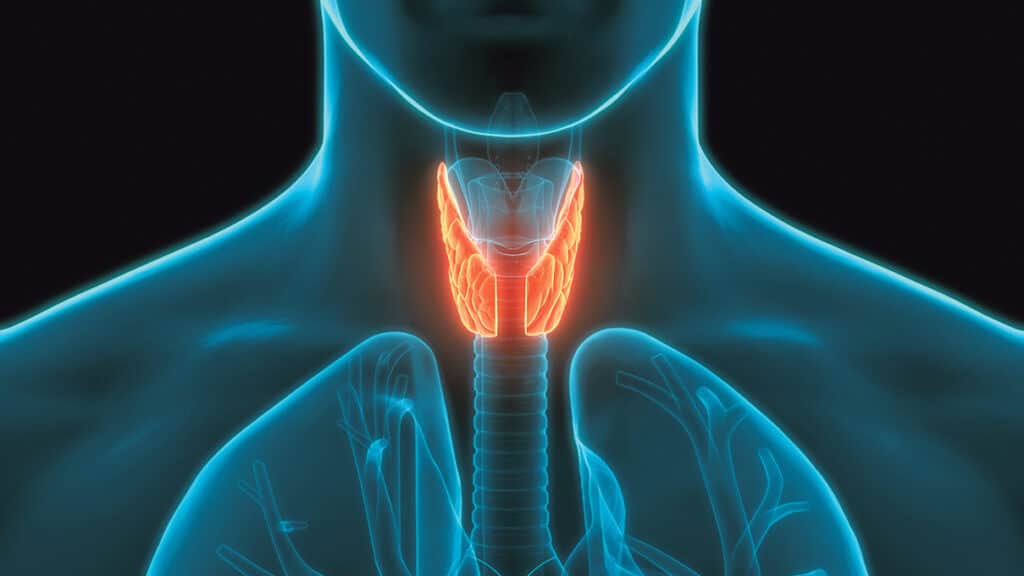

Eoin Roe has a chiropractic clinic in Skibbereen. He is also a certified functional medicine practitioner and provides help with chronic health conditions.
Call 087 9582362
www.roehealth.ie
Thyroid hormones affect your basal metabolic rate: How fast cells function in the body and the health of your stomach, liver, gall bladder, pancreas, small and large intestine are all related to your thyroid function.
There is an intimate bidirectional relationship with thyroid function affecting the gut and the gut also affecting thyroid function.
The most common cause of low thyroid function (hypothyroidism) is an autoimmune condition called Hashimotos, which attacks and destroys the thyroid gland if left unmanaged. The good news is that Hashimotos and other autoimmune conditions can respond well to changes in diet.
If you have been diagnosed with low thyroid function, this can impact your gastrointestinal health in a number of ways.
Constipation – Intestinal motility
Food is moved through your gut by muscles contracting in sequence to push the food through. When somebody has low thyroid function this can slow down significantly.
Due to the slow transit time, there is an increase in fermentation of food in the large intestine and this disrupts the balance of bacteria in your gut regardless of how healthy your diet may be.
Gallbladder function
Bile is stored in the gallbladder and, when you eat fatty foods, bile is released by the contraction of the gallbladder to help aid with digestion of fats. With low thyroid function contraction of the gall bladder is reduced. As a result, the bile becomes thicker, and is known as sludge, which is a precursor to gall stones forming.
Common signs that your gallbladder may not be functioning well are an inability to eat fatty meals or take supplements like fish oil; you can also experience bloating, indigestion or nausea especially after fatty foods.
Leaky gut
Your gut is an interesting organ in that it must allow nutrients and other things your body needs to pass through but at the same time make sure that unwanted things stay out. This is maintained by proteins that keep the integrity of the gut wall and are known as ‘tight junctions’. When there is inflammation in the gut these junctions break down, leading to gastrointestinal permeability, commonly referred to as ‘leaky gut’.
A result of leaky gut (gastrointestinal inflammation) is that by-products from bacteria can then enter the blood stream and cause systemic inflammation and can even bind to immune cells, causing further inflammation in the thyroid gland.
Microbiome (balance of
bacteria in the gut)
Studies have shown that people with Hashimotos have a microbiome that is completely different to those who don’t have this issue. It can become a vicious cycle in which an unhealthy balance of your microbiome triggers further autoimmune disease and poor gut function promoting an unhealthy microbiome because of the low thyroid function.
Additionally, a poor microbiome also causes a loss of oral tolerance which causes a person to start developing sensitivities to foods to which they previously had no reactions.
Another factor for those with low thyroid function is that the microbiome plays a role in converting T4 (thyroxine) into T3 (Triiodothyronine). Most of the hormone produced by your thyroid gland is in the T4 form which is inactive. T4 has to be converted to its active form T3 which is done throughout the body in the liver, kidney and muscles but also by by-products from bacteria in your gut.
So, for efficient conversion of thyroid hormones, you need a healthy gut microbiome. This is why it is so important to eat a wide variety of fruit and vegetables every day which will help you to have a healthy microbiome.
So how do you improve the connection between your gut and thyroid gland?
The first thing to check is that you are not in a low thyroid state: This is routinely done with a blood test to check your TSH (thyroid stimulating hormone) levels. If this is high you may need to take thyroid hormone medication.
The second is to find out if you have Hashimoto’s by having your antibody levels to TPO and Tg checked, as this indicates if an autoimmune condition exists. If so, it is important to manage this so that you can maintain gut health.
Thirdly, there are often complex mechanisms at play and a whole-body approach is required to successfully manage these conditions; just taking a probiotic or some digestive enzymes will not address the underlying autoimmunity nor address the autoimmune triggers that can make thyroid issues worse.
Eoin Roe is a Chiropractor and Certified Functional Medicine Practitioner based at Roe Health in Skibbereen. If you would like to get in touch or learn more, please look at our website www.roehealth.ie.


